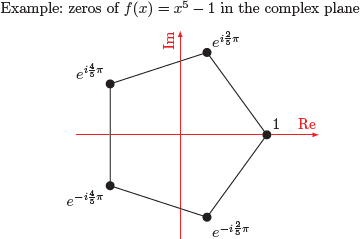Problem for the 241st birthday of Gauss
Given the following polynomial: How many distinct complex zeros does this polynomial have? Multiple occurrences of the same zero are only counted as one. (In this sense, the function has only one complex zero.)

Johann Carl Friedrich Gauss was a german mathematician, physicist and astronomer. He established the fundamental theorem of algebra and the geometric representation of complex numbers in the complex plane. Using complex numbers, regular polygons can be represented by the complex solutions of the equation . But what is the geometric representation of the zeros of the above polynomial ? Only use such tools to solve this problem, that would have been available to Gauss.
This section requires Javascript.
You are seeing this because something didn't load right. We suggest you, (a) try
refreshing the page, (b) enabling javascript if it is disabled on your browser and,
finally, (c)
loading the
non-javascript version of this page
. We're sorry about the hassle.

At first we consider only real solutions of the equation f ( x ) = 0 . Obviously x = 0 is a zero. Now consider only the remainder of the polynomial and its derivatives: g ( x ) = x f ( x ) g ′ ( x ) g ′ ′ ( x ) = x 4 + 4 x 3 + 8 x 2 + 8 x + 4 = 4 x 3 + 1 2 x 2 + 1 6 x + 8 = 1 2 x 2 + 2 4 x + 1 6 = 1 2 ( ( x + 1 ) 2 + 3 1 ) Obviously, g ′ ′ ( x ) > 0 for x ∈ R , so that g ′ ( x ) represents a strictly monotone increasing function that has exactly one zero. By trying, one finds the zero x = − 1 for the derivative g ′ ( x ) . This zero corresponds to a minimum of the function g ( x ) with the function value g ( − 1 ) = 1 − 4 + 8 − 8 + 4 = 1 . Thus, we have proven, that g ( x ) ≥ 1 > 0 for x ∈ R . Thus, the function g ( x ) has no real zeros.
The remaining zeros of f ( x ) are therefore complex and each two of the zeros are complex conjugate to each other: f ( x ) = x ( x − z 1 ) ( x − z 1 ∗ ) ( x − z 2 ) ( x − z 2 ∗ ) = x ( x − a 1 − i b 1 ) ( x − a 1 + i b 1 ) ( x − a 2 − i b 2 ) ( x − a 2 + i b 2 ) where z i = a i + i b i ∈ C , a i , b i ∈ R , b i > 0 .
Let's suppose we have a double zero with z 1 = z 2 = a + i b . (If this approach fails, we know that all zeros of the polynomial must be different.) g ( x ) = [ ( x − a − i b ) ( x − a + i b ) ] 2 = [ ( x − a ) 2 + b 2 ] 2 = ( x − a ) 4 + 2 b 2 ( x − a ) 2 + b 4 = x 4 − 4 a x 3 + 2 ( 3 a 2 + b 2 ) x 2 − 4 a ( a 2 + b 2 ) x + ( a 2 + b 2 ) 2 = ! x 4 + 4 x 3 + 8 x 2 + 8 x + 4 By coefficient comparison, the solution a = − 1 , b = 1 can be found. Therefore, our approach was valid and we have three different zeros z 0 z 1 z 2 = 0 = − 1 + i = − 1 − i The function can be written as f ( x ) = x ( x + 1 − i ) 2 ( x + 1 + i ) 2